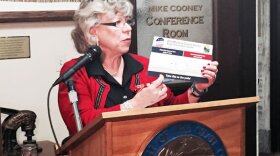Update 10/28/14
Read the apology letter from Stanford and Dartmouth here
Lawyers representing Stanford University spoke with Montana’s commissioner of political practices today about a controversial campaign mailer.
That flyer, sent to about 100,000 Montanans last week, used the state seal without permission, and purports to show the political leanings of those running for two seats on the state supreme court. Supreme court races in Montana are by law non-partisan.
Jonathan Motl, Montana's commissioner of political practices says, "The goal is to do something that takes away the absolute unfairness that Montanans feel when they look at that particular flyer. Ideally that response would come from Stanford and Dartmouth."
But Motl says Dartmouth College has not responded to his office’s request to talk about the flyer.
The flyer says it was sent by researchers at Dartmouth and Stanford. Stanford has said it’s part of a research project the university helped pay for, but that the project didn’t use protocols that would have required review by the university. A Dartmouth spokesman told the Associated Press that it’s conducting an internal review, but declined to answer specific questions about the flyer.
Motl says it’s still unclear to him who is ultimately responsible for the flyer - that it could be the three researchers at Stanford and Dartmouth, or an outside company or companies they work for. But, he says, the flyer was clearly sent without regard for Montana’s campaign laws, and he expects the universities to follow up.

"Given that Montana had, in 2008, 2010 and 2012, three consecutive election cycles when a particular corporate entity, Western States/American Tradition Partnership, basically ignored our campaign practice laws and carried out campaign activities," Motl says, "we need something from these two universities, that the universities recognize the inappropriateness of that mailing, and talk directly to the people of Montana, the 100,000 people that they sent that mailer to."
Motl says he’s in ongoing contact with Stanford, and that voters will receive some kind of communication, probably another mailer, before the election, explaining what happened. He says that his office will send that on it’s own if it has to, but he’s hoping both universities will participate in that communication.
"Whatever we do now is going to be a partial mitigation for what happened, but it may be the best we can do. There will need to be something that happens after the election as well, there will be a social debt that needs to be paid, a fine."
Motl says his office has clearly heard that many Montanans are upset about the flyer, and said many Stanford graduates who live in Montana have also been making their concerns about the flyer clear to that university.
The race for two seats on Montana’s Supreme Court pits sitting Justice Jim Rice against challenger David Herbert. And sitting Justice Mike Wheat is opposed by Lawrence VanDyke.
You can hear ourinterview with Jonathan Motl from last week here.







